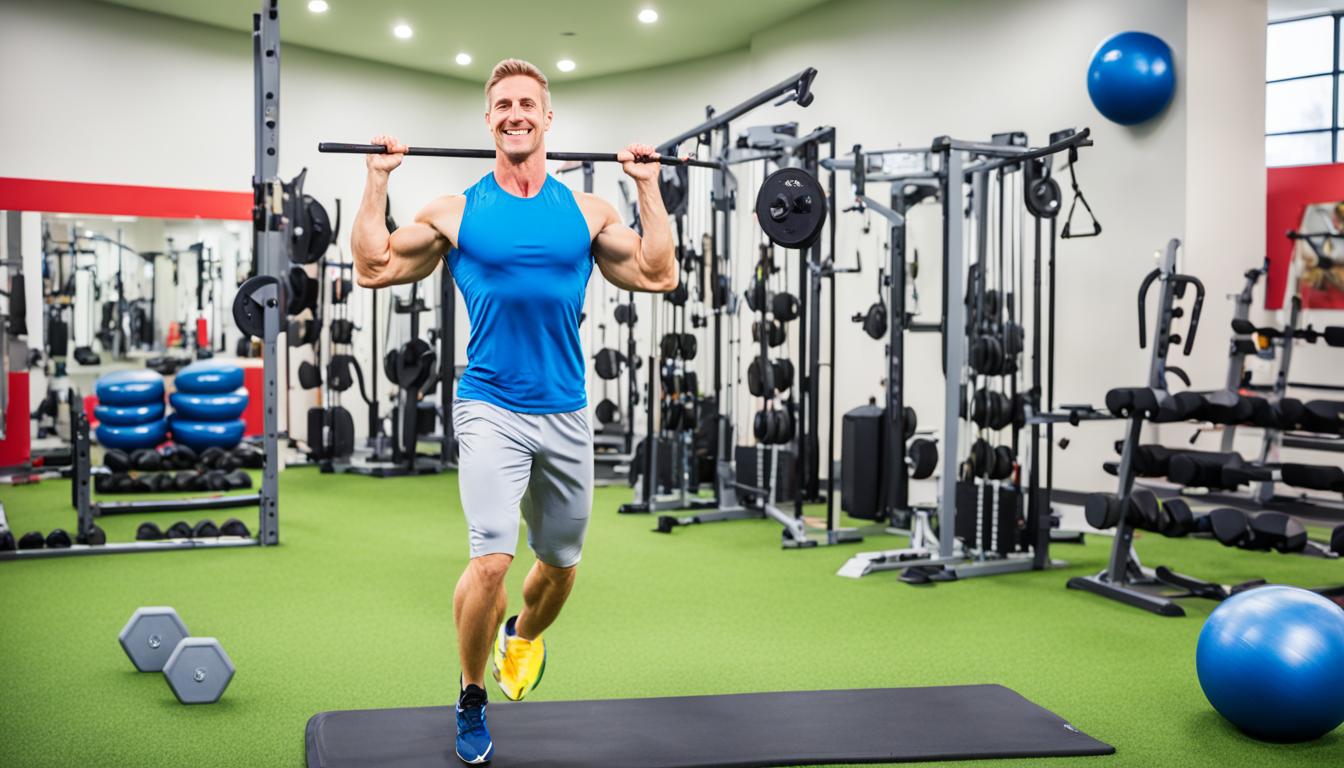Are you tired of the same old fitness routines that seem to provide minimal results? It’s time to consider functional training – a revolutionary approach to fitness that goes beyond traditional exercise methods. Functional training focuses on movements that mimic real-life activities, helping you improve your strength, flexibility, and balance in a way that translates to better performance in everyday tasks and activities. By engaging multiple muscle groups simultaneously and emphasizing natural movement patterns, functional training can take your fitness to a whole new level.
Key Takeaways
- Functional training offers a dynamic and effective way to improve your overall fitness.
- It focuses on movements that replicate real-life activities, enhancing strength, flexibility, and balance.
- Functional training engages multiple muscle groups simultaneously, providing a more efficient workout.
- By training your body to move efficiently, functional training improves performance in daily activities and reduces the risk of injury.
- Consider incorporating functional training into your fitness routine to maximize your fitness potential and achieve peak performance.
Ready to take your fitness to the next level? Discover the incredible benefits of functional training and see how it can transform your body and enhance your daily life.
The Benefits of Functional Training
Functional training offers a wide range of benefits that make it an ideal choice for athletes and individuals seeking to improve their overall fitness. Whether you’re a professional athlete or just starting your fitness journey, implementing a functional training program into your routine can yield incredible results.
One of the key advantages of functional training is its ability to enhance your overall physical well-being. By engaging multiple muscle groups simultaneously, functional exercises promote improved muscle balance and coordination. This type of training also focuses on movements that replicate real-life activities, which can help you perform daily tasks with greater ease and efficiency.
The preventative nature of functional training is another significant benefit. By targeting the muscles and movements commonly used in everyday activities, functional training helps reduce the risk of injuries both during exercise and in daily life. Additionally, functional training exercises can contribute to increased flexibility and mobility, allowing for a wider range of movement and reducing the likelihood of muscle imbalances or discomfort.
Functional training is highly customizable to individual needs and goals, making it a versatile training method. Whether you’re an athlete looking to improve your performance or an individual seeking to enhance your day-to-day movements, functional training can be adapted to suit your specific requirements. Certified functional training programs are available, offering professional guidance and ensuring that you receive proper instruction and support in achieving your fitness goals.
When it comes to efficiency, functional training is a time-effective way to burn calories and achieve results. Combining strength and cardio exercises, functional training provides a dynamic and engaging workout that maximizes calorie burn and improves cardiovascular fitness.
Unlock Your Potential with Functional Training
“Functional training has completely revolutionized the way I approach fitness. Not only has it improved my strength and performance as a professional athlete, but it has also enhanced my daily movements and overall well-being.” – Professional athlete, Jane Smith

Functional Training vs. Traditional Strength Training
Functional training and traditional strength training are two distinct approaches that yield different results. While traditional strength training focuses on isolated exercises targeting specific muscle groups, functional training emphasizes movements that mimic real-life activities. Functional exercises incorporate a wide range of movements using bodyweight or functional equipment, promoting overall body functionality, balance, stability, and coordination.
Functional training prepares your body for the demands of daily life by training it to move efficiently and effectively. Unlike non-functional exercises that solely focus on specific body parts or muscle appearance, functional training works multiple muscle groups simultaneously, engaging the core and promoting natural movement patterns.
Through functional training, you develop the strength, flexibility, and stability needed to perform daily tasks with ease and minimize the risk of injury. By integrating exercises like squats, lunges, deadlifts, push-ups, and planks into your routine, you improve your body’s functionality and enhance its ability to meet the challenges of everyday life.
Traditional strength training, on the other hand, primarily aims to build muscle mass or strength in a specific lift. It often involves exercises that isolate particular muscles or muscle groups, such as bicep curls, leg extensions, or bench presses. While these exercises can be effective for targeting specific areas, they may not translate directly to improved functionality in daily activities.
Functional training is a comprehensive approach that prepares you for the movements and challenges you encounter in your everyday life, whether it’s carrying groceries, playing with your children, or participating in recreational activities. It enhances your overall physical abilities, allowing you to move with ease, stability, and confidence.

By incorporating functional training into your fitness routine, you can optimize your physical performance and improve your overall quality of life. So, whether your goal is to enhance your athleticism or simply move through your daily activities more efficiently, functional training offers a functional and practical solution.
The Science Behind Functional Training Effectiveness
Functional training is a highly effective method that engages multiple muscle groups simultaneously, resulting in more efficient workouts. Unlike traditional strength training that focuses on isolated exercises, functional training emphasizes movements that mimic real-life activities. This type of training improves neuromuscular coordination and proprioception, enhancing overall movement control and body awareness.
One of the key benefits of functional training is its ability to promote joint stability and mobility. By incorporating exercises that target multiple joints and muscle groups, functional training helps prevent injuries and improves daily life functionality. The movements involved in functional training require the body to work as a cohesive unit, enhancing core strength and stability.
Functional training is not only effective in improving strength and flexibility but also in enhancing muscular endurance and cardiovascular fitness. The dynamic nature of functional exercises challenges the body to work against resistance while maintaining proper form, leading to increased endurance and improved cardiovascular health.

“Functional training engages multiple muscle groups simultaneously, resulting in more efficient workouts.”
Enhancing Overall Physical Fitness
Functional training offers a comprehensive approach to fitness, targeting various aspects of physical performance. By integrating movements that require coordination, stability, and strength, functional training enhances overall athletic performance and everyday functionality.
The neuromuscular coordination developed through functional training improves the body’s ability to execute movements with precision. This coordination translates into improved performance in sports, physical activities, and even simple tasks such as walking and reaching for objects.
The emphasis on joint stability and mobility in functional training promotes healthy movement patterns and reduces the risk of injury. By strengthening the muscles surrounding the joints and improving range of motion, functional training allows for fluid, pain-free movement in daily life.
Functional training also plays a crucial role in developing core strength. The core muscles, including the abdominals, back muscles, and pelvic floor, provide the foundation for overall stability and proper posture. By targeting these muscles through functional exercises, individuals can improve their balance, prevent back pain, and enhance overall physical fitness.
The combination of strength training and cardiovascular exercises in functional training leads to improved muscular endurance and cardiovascular fitness. These benefits are particularly valuable for athletes or individuals seeking to enhance their stamina and endurance for sports or daily activities.
Whether you are an athlete looking to improve performance or simply aiming to enhance your daily life activities, functional training is a highly effective and versatile approach to fitness.
How Functional Training Enhances Your Daily Life
Functional training goes beyond the gym and enriches your everyday life. By focusing on movements that replicate daily activities, functional training prepares your body for the challenges of daily life, making tasks like lifting heavy objects or getting up from a chair easier. It trains the same muscle movements used in your daily activities, improving your functional fitness and overall physical ability.
One of the key benefits of functional training is its positive impact on balance and coordination. By engaging multiple muscle groups and incorporating exercises that challenge your stability, functional training improves your balance and coordination, making your movements more efficient and reducing the risk of falls. This is especially important as we age, as balance and coordination tend to decline over time.
Moreover, functional training helps prevent injuries by strengthening the muscles around your joints and promoting proper movement patterns. By specifically targeting the muscles and movements involved in your daily activities, functional training enhances your body’s ability to move safely and efficiently. This reduces the risk of injuries in your everyday life and allows you to move with confidence and ease.
Flexibility and mobility are also key components of functional training. By incorporating exercises that focus on full range of motion and joint mobility, functional training improves your flexibility and allows you to move more freely in your daily activities. Whether it’s reaching for objects on high shelves or bending down to tie your shoes, the increased flexibility and mobility from functional training make these actions easier and more comfortable.
In addition to the various functional benefits, functional training also offers a time-efficient way to burn calories. By combining strength and cardio exercises in a dynamic and engaging manner, functional training provides an effective workout that helps you burn calories and achieve your fitness goals. Whether you’re looking to lose weight, improve your cardiovascular fitness, or increase your overall stamina, functional training can help you achieve these goals efficiently.
Overall, functional training is not just about building strength and muscle mass; it’s about enhancing your daily life. By improving your functional fitness, balance, coordination, injury prevention, flexibility, mobility, and calorie burn, functional training equips you with the physical capabilities to tackle your daily activities with ease and confidence.

Keep reading to discover the science behind the effectiveness of functional training.
Conclusion
Functional training is a versatile and effective training method that can benefit individuals of all fitness levels. Whether you’re an athlete looking to enhance performance or someone seeking to improve daily movements, functional training offers a wide range of benefits. It improves strength, flexibility, balance, and coordination, while also preventing injuries and enhancing overall physical well-being.
By focusing on practical, real-life movements, functional training prepares your body for the demands of daily life and contributes to a healthier and more functional lifestyle. Incorporating functional training into your fitness routine can maximize your fitness potential and help you achieve peak performance.
With its emphasis on multiple muscle groups and engaging core exercises, functional training provides a time-efficient way to achieve your fitness goals. Whether you’re lifting heavy objects, participating in sports, or performing daily activities, functional training enhances your ability to move efficiently and reduces the risk of injuries.
Take your fitness journey to the next level by embracing functional training and experiencing the transformative benefits it has to offer. Start incorporating functional exercises into your workouts today to unleash your full potential and enjoy a more functional, healthy, and vibrant life.
FAQ
What is functional training?
Functional training focuses on movements that mimic real-life activities to improve strength, flexibility, and balance. It uses exercises like squats, lunges, and push-ups to replicate daily movements.
Who can benefit from functional training?
Functional training is suitable for athletes looking to enhance their performance and individuals seeking to improve their fitness. It offers a wide range of benefits, including improved overall physical well-being, balance, coordination, injury prevention, and preparation for daily activities.
How does functional training differ from traditional strength training?
Functional training focuses on movements that mimic real-life activities, engaging multiple muscle groups simultaneously. Traditional strength training often involves isolated exercises targeting specific muscle groups.
What are the benefits of functional training?
Functional training enhances overall physical well-being, improves balance and coordination, prevents injuries, prepares the body for everyday activities, and contributes to flexibility, mobility, and calorie burn.
How effective is functional training?
Functional training is highly effective as it engages multiple muscle groups, improves neuromuscular coordination and proprioception, promotes joint stability and mobility, develops core strength and stability, and improves muscular endurance and cardiovascular fitness.
How does functional training enhance daily life?
Functional training trains the muscle movements used in daily activities, making tasks like lifting heavy objects or getting up from a chair easier. It improves balance and coordination, reduces the risk of falls, prevents injuries, enhances flexibility and mobility, and offers a time-efficient way to burn calories.
Source Links
- https://www.webmd.com/fitness-exercise/how-to-exercise-with-functional-training
- https://www.boostcamp.app/blogs/master-functional-strength-training-essential-guide
- https://www.chathamclub.com/power-of-functional-training/


